Chapter 7
Death Camp
Sun-myung Moon was taken to a holding cell in Pyongyang on April 10, before being transferred to a labor camp to serve out his sentence. Mindful of his position as the new arrival, he walked straight to the spot nearest the toilet and sat down. A prisoner eyed him for a while, and then told him to come over and sit next to him.
"What are you in for?" the man asked. Mindful of another rule among prisoners - don't ask too many questions - Moon wondered whether the man was an informer. He said nothing.
"What is your crime?" the man persisted.
Moon began to tell him his story, in the third person, using the English name Lawrence. He told him how Lawrence' had searched to find God's will and had ended up in prison.
The prisoner listened intently, nodding occasionally as if the tale confirmed something for him. When Moon had finished, the man told his story. His name was Kim Won-dok.1 He had been in the cell longer than any other prisoner and was therefore the cell leader.
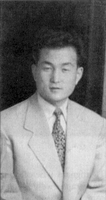 |
| Kim Won-dok, Moon's fellow prisoner and follower. (HSA-UWC Seoul) |
"I graduated from the Japanese Military Academy," Kim began. "I am a major in the People's Army." Kim explained that he was not a Communist but that he was an aide to General Mu-long, a north Korean officer with close ties to the Chinese Communists.2 While the general was away on a trip to China, intelligence agents discovered that Major Kim had connections with south Korean officials. He was arrested, accused of being a spy, judged guilty, and placed in the holding cell to await execution.
One day while asleep in his cell, Kim had dreamed someone was calling his name. Twice he ignored the call. The third time he responded. In his dream an old man dressed in traditional Korean clothes appeared and assured him he would not be executed. The old man told Kim that he would soon meet a young teacher from south Korea. A few days later, he was summoned and informed that his sentence had been commuted to five years. General Mu Jong had heard of his case when he returned from China and petitioned on his behalf.
Some nights afterwards, the old man appeared again in his dream, chiding him for his complacency and instructing him to prepare to meet the young teacher from the South. Then his deceased father appeared and led him along a corridor to some steps. At the top of the steps was a throne, so bright that he could not see who was sitting on it.
When Moon arrived in the cell and they began talking, Kim intuitively knew that this was the person he had been told to prepare for in his dream. On the strength of this experience, he became Moon's follower.3
On May 20, 1948, Sun-myung Moon and Kim Won-dok were among a contingent of prisoners transferred to a labor camp beside the village of Dong-ri near the east coast industrial city of Hungnam. The four hundred villagers took little interest in arrivals as none were locals.4 It was an indifference the authorities cultivated. Prisoners from the western provinces were imprisoned in camps in the east away from the clan support system and where they would be less likely to try to escape.5 Prisoners received less visits than if they had been jailed locally as relatives were discouraged by the long, and often difficult, trips.
Of the labor camps in north Korea at the time, the Aoji Coal Mine in North Hamgyong Province was considered the most severe. Hungnam was next, then Bongung, which was nearby and where conditions were somewhat better. One prisoner, a clerk in Wonsan Station arrested for distributing anti-government leaflets, had heard before being sent to Hungnam that you had to be over fifty kilos to qualify for work in the Aoji mine. In the holding cell, he drank only water for twenty days and brought his weight down to forty-two kilos. While two fellow activists were sent to Aoji, he was sent to Hungnam.6
The first intake of nine hundred prisoners had arrived at the Hungnam camp on February 4. On that first day, when they began to fill up the chilly buildings of the former Japanese prison, there had been a boisterous atmosphere mixed with apprehension.7 Guards had pushed them into cells. Each cell had twenty to twenty-five inmates.
Uniforms were distributed with kyo, the first syllable of kyodoso, meaning prison camp, in red paint in Korean characters on the back.
"Whoever painted this has worse writing than me, " a prisoner joked.
"Do you think this red lettering matches the blue of my uniform?" said another. The ordinary criminals among the group joked and giggled. The political prisoners maintained a tense silence.
"Shut up!" Four guards kicked open the door of the cell. "Strip to your underclothes and face the wall." The guards painted the red letters on the back of their underwear, and the criminals began giggling again.
After the guards left, the inmates began chatting about their crimes. "I live near the thirty-eighth parallel," one seventeen year-old boy said. "One day I went fishing, and the further I went downstream, the more fish I was catching. So I continued down. Then I was captured by a police agent." The boy was sentenced for trying to escape to south Korea.
"Then we'd better call you a reactionary element," said one of the criminals.
"I was sent here but I'm innocent," said a twenty year-old putting on an innocent look. "A pretty girl in my village loved and tempted me. So I made love with her for our mutual enjoyment. But I was arrested for rape."
"Show us what happened," said one of his cell-mates. The prisoner stood up and began gyrating as if to imaginary striptease music. The prisoners laughed.
"Don't stop. You're getting me excited," someone said.
An old man confessed: "I worked at construction sites. I tried to hide a few nails and bits of wood to repair my house. They arrested me. Do you know what they called my crime? Plunder of government property."
The stories continued, but the real hard-core criminals and the serious political offenders kept quiet. As one prisoner was telling how he had been seized for refusing to accept a citizenship identity card from the Communist authorities on religious grounds, a guard shouted at them to stop talking. The prisoners fell silent and within a few minutes were asleep.
The next morning a piercing siren announced the new day. Guards began shouting, "Get up! Get up!"
Breakfast was passed into the hut in noisy metal howls. The prisoners looked at the salty soup, and realized how hungry they were. Even the common criminals were quiet. In thirty minutes the entire camp was assembled outside.
The commandant, an army captain, addressed them. "This is the Hungnam Special Labor Camp. The purpose of our camp is to supply labor for the Korea Nitrogen Fertilizer Factory," he announced. Armed guards divided the prisoners into work-teams of ten. Ten teams formed a work party.
It was a two-mile march to the plant. The prisoners walked by several houses in the cold morning. A small boy came sleepily out of one house, rubbing his eyes, and urinated on the ground.
Hungnam's industrial site seemed to stretch for miles. It was in fact the most extensive basic chemical and light-metals production complex in East Asia. It was dominated by three huge plants, the Korea Nitrogen Explosives Factory, the Korea Nitrogen Fertilizer Factory and the Bogun Chemical Factory. Several smaller plants made leather, bullets, grenades and other products.
When the convicts reached the fertilizer factory, they found it bustling with activity. Smoke belched from chimneys. Trains shunted back and forth on the tracks. During the Japanese occupation, it had been known as the Chosen Nitrogen Fertilizer Company, and had developed from its establishment in 1927 to become the world's second largest fertilizer works. The file of prisoners was led to a mountain of ammonium sulfate which had solidified and had to be broken up and bagged in forty kilogram sacks. The work would keep them busy for over two years. Each ten-man team was told it had to do seven hundred bags in an eight-hour work day. Back at the camp that evening, prisoners were frisked individually and then pushed into their huts. Supper arrived - a handful of boiled grain and the same salty soup. After the meal, they looked at the skin of their fingertips which had peeled off from exposure to the fertilizer.
The day was not over. At 7.30 p.m. the prisoners were ordered to have a 'newspaper reading meeting' in each cell. They didn't know what it meant. A short while later, a guard distributed the Rodong Shinmun, the Korean Workers' Party daily. A prisoner who could read was ordered to read the paper's editorial aloud. Then they had to discuss it. The convicts were silent, not knowing what to say.
"You should criticize your work performance, and confess the crimes you were sent here for," a guard said. They discussed dispiritedly, their minds on fatigue and hunger. Some time later the siren sounded. A guard went from hut to hut banging the walls with a stick shouting "checking." He looked into each hut to check that none had escaped.
"Sleep!" he ordered. The prisoners, lying head to foot on reed mats, with one blanket for four persons, fell into a deep sleep. The next morning the siren sounded again, the same watery soup came, and the prisoners assembled outside as before.
"Any prisoners wish to report sick?" the commandant yelled. Half of the assembly stepped forward. Guards closed in.
"Where do you feel ill," a guard asked an old man.
"Here. My hip hurts. I don't think I can work today." The guard smashed his baton down viciously on the man's hip. After a few blows the prisoner fell to the ground.
"This is how ill you need to be to go to the sick bay," the guard shouted. "If anyone is really ill, step forward." The prisoners returned to their ranks. They shuffled to the plant where they were told the daily quota had been increased to thirteen hundred bags.9 If a team failed to meet the new target they had to stay on, missing dinner if necessary!10
Recalling this day, Kim In-ho wrote: "From this day on began our miserable forced labor. The message seemed to be, 'If you can't endure, die'" The prisoners worked through the bitter winter, their starving bodies braced against the cold. With the first blow of spring warmth and the painful softening of the land around, their bodies relaxed and the weaker prisoners fell sick.
When Sun-myung Moon and Kim Won-dok arrived in May 1948, a pall of misery hung over the barracks. The place had the look of a death camp. The inmates, now numbering fifteen hundred, and crammed forty to a cell, were emaciated and lifeless. Every day, men died and new prisoners arrived to replace them.
Initially, around ten per cent of the inmates were political offenders and another ten per cent were soldiers or officials sentenced for dereliction of duty. The rest were criminals. But the numbers of political prisoners steadily increased. They were now being kept in separate huts, and on separate work-teams in the factory. But the definition of political offender was loose. Almost any crime near the thirty-eighth parallel, even trying to sell an ox across the border, was considered political.
One ideological offender, a brigade commander in the People's Army, had been sentenced to five years for placing a 'Long Live Kim Il-Sung!' banner in a field as a target for shooting practice. "There was nothing else to shoot at," he explained to his cell-mates.11
Real opponents of the Communist regime had to be careful who they confided in. Prisoners who considered the real anti-Communists to be dangerous sometimes informed on conversations overheard in the cells.
Moon was put in barrack two, cell five. A board outside the hut listing each occupant's number, crime and term, identified his cell-mates as political prisoners. His number was 596. He drew strength from the fact that it sounded like the word for 'unjust suffering.'12 God had given him this number, he said to himself
Taking stock of his fellow prisoners, he saw that some had given up the fight, and figured that they would soon die. If once-healthy men were dying after only a few months, how could he endure a five-year sentence? He realized that he, too, had been sent to die. It was useless to try to escape and equally futile to try to maintain dignity through open defiance of the prison guards. A defiant prisoner would be singled out immediately for severe punishment. In his determination to survive, Moon saw only one way. His defiance would in spiritual. He resolved to fight as if all men's salvation depended on him, indeed as if God's single hope for the world rested on his victory. The battle was spiritual, and he was called on to defeat Satan, to defeat the spiritual forces that drove men to evil. His weapons would be prayer, discipline and love. He determined to maintain a loving attitude to God, to his fellow prisoners and to the Communist guards, regardless of how miserably he was treated. That spiritual will, which had borne him through an earlier prison experience, was to face in Hungnam its ultimate test. If his love for God weakened, he would be gripped by the same passion that consumed most of his fellow prisoners, sheer desperation for survival.
His immediate challenge was to handle the starvation diet and avoid falling victim to the obsession with food which distracted almost all the prisoners. He decided to give away half of his three hundred gram grain ration to one of the men beside him, reducing his ration to equal that of the men in the sickbay. He did this at every mealtime for two weeks. Then he began eating the whole ration again, viewing the doubling of his food as a gift from God. He dispassionately studied the reaction of his own mind and body to see if he could desire God's love as much as men desired food. He concentrated more upon comforting God than upon his desire for food.13
"I realized very clearly how God loved me and knew how much I was suffering. Since he knew it, I could not ask him to relieve or remove the suffering. Unless there is a condition made for God to save one from such difficult circumstances, he cannot do it. Therefore, if I had prayed to God to take such suffering from me, it would have given him more pain. I did not pray (for) this. I prayed, 'God, do not worry about me.' I did not say, 'Help me, Father.' Therefore, under (no) circumstances (did) I betray God or deny him, but only trusted him and never worried him. I examined myself to see if I could be grateful under such circumstances, and could carry on the high ideals of establishing his kingdom on earth.
"Under such circumstances, one might long for worldly things, an easy life. Those things (came) into my mind, too. Although I had a family who loved me and whom I could depend on, I always looked for greater things. My sole desire was to obtain the victory in the battle of good and evil. To achieve this I was willing to pay indemnity. I knew the secret of overcoming evil (was to) let the evil strike me first. I could overcome it later."14
He determined to throw himself into the work so that it became a source of fulfillment. He fell into the prison routine - 6 a.m. siren; 7 a.m. breakfast; and at 7.30 a.m. a hand bell would ring, guards opened the cell door and the men lined up outside.15 The commandant would address them from a dais, barking instructions. No smoking, no escaping. In the first few months, two men tried to escape. Their bodies were displayed as a warning. Four others, who were captured, received an extra year on their sentence. The two hundred and fifty guards assigned to the camp watched the prisoners constantly. Each morning, the fifteen hundred prisoners walked to the plant in two columns of four men abreast, their hands linked and their eyes on the ground to prevent thoughts of escape. A man who looked up was beaten.
They arrived at the factory at 8 a.m. The prisoners' leader would meet for ten minutes with the fifteen work party leaders and give the days' assignment, and work began. A civilian worker was assigned to each team to check the weight of the sacks. Otherwise the prisoners worked and ate separately from the regular workers at the plant.
At noon, the siren sounded for lunch. The lunchroom had long wooden tables and benches. The grain and soup was put at each place. Armed guards stood at the door making sure the men didn't look at each other. When a starving man watches another man eat after he's finished his own food he masticates, an unconscious phenomenon which speeds up the starvation process.16 Many prisoners nevertheless had their eyes glued to others who had not yet finished eating. Sometimes during the meal, a starving prisoner would collapse and die and other prisoners would fight over the grains of rice in the dead man's mouth. After lunch, there was a thirty-minute rest period. The guards made prisoners sing or perform. Those selected could never muster the feeling to do it well. Moon was never chosen to perform.
The afternoon work began at 1 p.m. and lasted till 5 p.m. A team which failed to meet the quota no longer had to stay behind, but had to make up the shortfall the next day The prisoners filed back into the camp through the gate, where the leader of the prisoners and a guard counted them. A medical officer and three inmates, who were doctors, tended the sickbay. It was always full. But most of the men who died never made it there. They died in their huts.
Moon's job was to fill the sacks with fertilizer and lug them to the scales. He attacked the work with a vigor that made the others curious.
"Why do you work so hard, Mr. Moon?" asked Kim In-ho, a nineteen year-old anti-Communist guerrilla in his cell.
"If I work hard, it means less work for the others, doesn't it?" Moon replied.
Kim had noticed that Moon never flopped down exhausted at the end of the day like the other cellmates, but always sat upright with a calm expression on his face. He wondered why. He was also curious why, after work, Moon never washed off the grime and fertilizer dust in the factory effluent water with the other prisoners.
One morning Kim got up early at about five o'clock to go to the toilet. He sat up and, as his eyes focused, he saw Moon sitting in the corner of the cell, praying. Hearing the movement Moon opened his eyes.
"Mr. Kim, you're up early," said Moon. They whispered so the guards would not hear them.17
"Do you always get up so early? Don't you feel tired?" asked Kim.
"It's my habit. I feel uncomfortable if I oversleep." Moon took off his shirt. He dipped a flannel in the remains of his drinking water and began to clean himself.
"Don't you feel cold?" Kim asked. "If you catch cold you'll. . ."
"I don't wash in the factory water. I clean myself like this," Moon explained. After washing he prayed again.
Once, Moon was discovered exercising in the early morning when he should have been sleeping and was confined in a punishment cell for a week. After that, he continued his routine but would pretend to he asleep when the guards passed. Through this kind of discipline, Moon was able to avoid the plunge into despair. Each day he woke with the anticipation that something new would happen. He looked forward to the small incidents and exchanges which made each day different. In this way, he sustained his vision of a future world of peace amid the misery of the labor camp. On the long tramp to the factory each morning, he would tell himself he was walking to an ideal world.
One day a new man, number 919, joined Moon's work-team. As he was unused to manual work, the team leader18 gave 919 the job of holding open the sacks while Moon and another prisoner shoveled in the fertilizer. He couldn't manage that properly, so Kim put him on tying up the sacks, the simplest task on the team, but even here he was having difficulty. Prisoner 919, whose name was Pak, was disoriented with hunger and was slowing the team down, and the other prisoners were getting anxious that they would not make the quota."19 For the next few days, Moon took care of him. After filling each sack, Moon patiently helped him tie it up until he could do it properly himself. The man was moved by the kindness and felt he could trust Moon.
Pak had bought some fish liver oil with some of the money he had, and shared it with some of the more emaciated of his cell-mates. "Don't help everybody," Moon advised him. "You may be helping Satan."
"What do you mean?"
"Some of the prisoners here are innocent and should be helped. But others are here because they are paying for crimes they committed. If you interfere with their indemnity you are not really helping them. Please ask me which ones to help."
A few weeks later Pak came to talk to him.
"The camp commandant has asked me to be the camp leader. What do you think? I told him to give me two days to think about it."20 The overall leader's job was to supervise the fifteen group leaders, who did not work.21 The previous leader had finished his sentence, and Pak, as an army officer, was respected by the guards and seen as an acceptable choice to replace him.
"There is a special meaning in this. Please accept it," Moon said.
Pak was introduced by the commandant at the morning assembly. "Prisoner 919 is your new leader You must do what he says."
That night Pak had a dream. An old man in white traditional Korean costume shook him: "Do you know who that man is who helped you for those few days?" He said he didn't know. "That young man is the one you've been looking for since your childhood. He is the Messiah. Jesus said, why do you look at me, I'll come back as you saw me go. That man is the one," the old man said.22
Pak, who had attended a Christian school and served as a deacon in a church in Pyongyang, was profoundly moved by the dream. He lay awake for two nights wondering about his experience. If the dream was true and this man is the second Lord, what was he doing here?
Two days later, he sat behind Moon at the morning assembly. Moon turned round, "You had a dream two nights ago, didn't you?" he asked. Pak was stunned.
He started working with Moon's team again to watch him. Pak arranged for Moon to have some time off so they could talk. Once they were alone, the two men formally introduced themselves for the first time and told their stories.
"I am Pak Chong-hwa," Pak began. "I am from South Pyong-an Province. I was in the army and was imprisoned for abuse of authority and negligence."
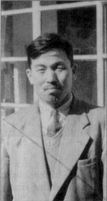 | 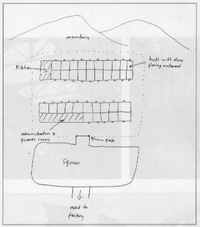 |
| Pak Chong-hwa, Moon's fellow prisoner in Hungnam, who later travelled with him to South Korea during the war (HSA-UWC, Seoul) | Sketch of the Hungnam labor camp by Pak Chong-hwa. |
"I am from Jeongju, North Pyong-an province. I am Moon Yongmyung. My prison number is 596. I was conducting evangelical activities in south Korea. God revealed to me that I should return to north Korea. I was arrested for disturbing society."
Pak, who was thirty-five, explained he was a lieutenant-colonel in the north Korean military police and had been sentenced after a captain in his command was found to have been helping south Korean merchants smuggle goods across the border. In addition, he had been accused of incompetence and disobeying orders, by allowing his border unit to engage in skirmishes with south Korean forces without permission. After a few days in the camp, he said, the hunger had started driving him crazy. At lunch time, prisoners received a radish each with their grain and soup. When he saw someone else with a bigger radish it took him all day to overcome the anguish. Now, as the leader, prisoners would give him some of the food brought by their relatives in exchange for favors.
Their talk came around to the Bible.
"If you've studied the Bible, then you know who John the Baptist is?" Moon asked.
"Yes, he was a great prophet. He wore camel hair and fasted, and lived on locusts and honey."
"He did those things, but he could not fulfil his responsibility That was the reason why God could not prevent King Herod from cutting off his head," said Moon.
"That's not true," Pak said. "He was a great man of God. It says in the Bible."
"He should have become Jesus' leading follower and testified to him," Moon said.
"He did testify to Jesus. In the Bible, it says that, when he baptized Jesus, the dove descended, and he testified," Pak argued.
"He just had a spiritual experience, but then he just continued on his way," Moon asserted. "Why didn't he follow Jesus?" They talked most of the day with Pak firing off questions and challenging Moon's claim that John the Baptist had failed to really follow Jesus, despite having apparently recognized that Jesus was the Messiah. Moon stated his points quietly, not wishing to engage in argument or make Pak angry. He wanted Pak to intuitively understand that he was talking to him, not about history, but about what he saw as Pak's own mission.
"Perhaps the best thing is for you pray about it, and tell me what you feel afterwards," Moon said.
Pak was unsettled by their disagreement. Moon had annoyed him so much that he even lost his desire for food. Again, he could not sleep properly for three days. Pak prayed and intuited that his spirit was rattled because he had not believed the old man in his dream. When he saw Moon he apologized to him for not having heard him out.
"I believe you now," he said.
Moon explained some of his personal experience with Jesus, and tried to help Pak consider Jesus' situation realistically, as it might have been at the time, rather than from the perspective of two thousand years of Christian worship and doctrine.
"It is easy to believe in Jesus now, but when he was alive, it was almost impossible for ordinary people to understand and accept him," Moon said. "So God prepared people like John the Baptist to testify to him, and help others recognize that Jesus was the Messiah. But it was difficult for John to believe what God showed him about Jesus. He had known Jesus as the illegitimate son of Mary. If Jesus had been born in a palace, think how much easier it would have been for people to accept him. But Jesus was something of an outcast, even in his own family, due to the unusual circumstances of his birth. It was a terrible burden for him to overcome. Jesus had a miserable family life. This was his mother's fault," he said.
"What?" said Pak.
"Don't you think that if Jesus' early life had been happy, and that if his family had recognized his special character, the Bible would have recorded it? His early life is shrouded in mystery because it was a period of unhappiness. His family neglected him."
"I can't believe that," Pak fumed.
"Why do you think Jesus asked, 'O Woman, what have you to do with me?' when Mary spoke to him at the wedding?23 It meant something. She had fulfilled a providential role in bearing him, but she had not. . .
"What are you talking about?" Pak walked away from him, furious at the assault on his beliefs.
Pak was so worked up that he could not sleep at all that night. His soul felt tormented, and even his body was wracked with pain. The discomfort lasted a week, and eventually convinced him that his attitude was wrong.
"I am sorry," he said to Moon.
Moon smiled at him. "I was thinking of giving you a hard time for another ten days, but now you've repented, it's OK"24
On a third occasion, Pak became angry when Moon told him that Jesus had been deserted by his disciples and that Judas had betrayed him out of jealousy.25 That night the old man appeared again in his dream and said, "From now on, you follow him. Don't doubt him any more."26
Pak began to call Moon Sonseng-nim (Teacher), and Moon called him by his first name, Chong-hwa. Given that Pak was the prisoners' leader and was seven years older than Moon, this was unusual in the context of hierarchical Korean relationships. It may be compared in a western context with a teacher and his young student reversing roles.
Pak offered to assign Moon the easiest job on the work-team which was tying up the sacks, but Moon refused.
"If I do the easiest jobs, Satan can attack our work to build God's kingdom.27 We have to start with the most difficult job."
"Well, loading the sacks is the hardest," Pak said.
"Then from now on, I will do that," Moon said.
On August 15, the third anniversary of the end of Japanese colonial rule, Moon was awarded a prize as the best worker in the prison. There was a ceremony and the commandant presented him with a certificate which said: 'Prisoner 596 has worked hard and is of upright character' The assembled prisoners applauded, uncritically. Moon felt as if Satan himself had acknowledged his determination to prevail. The award was given twice a year, on January 1 and on August 15. He won the next two awards.28
"See how we do this terrible work," Moon said to Pak one day, with quiet intensity. "Our fingers bleed and even after months the mountain of fertilizer seems no smaller."
"Yes, I know."
"One day, all this work could be done by one man controlling a machine. One man could do in three hours what it takes all of us all day to do!"
"Well, maybe," Pak said. "But we are in a prison, and no one is going to bring us a machine."
"But think about the future. Where will you be thirty years from now? Will you be here? Of course not. You know, one day the world will be one. The world will be God's kingdom. It will be unified in the love of God. There will be no barriers between races and nations and ideologies. We will speak the same language. People will work not to survive, but because they would be bored not working. People will work maybe for three hours a day Everything will be automated. This is God's kingdom. We cannot just think about it, we must work to build it. We must promise to Go that we will follow this goal. Do you see?"29
"Yes." Pak looked at him. He had scribbled notes on bits of paper.30 He was inspired, more by how a man could have such vision in such circumstances, than by the vision itself. "Yes, I see," he said again.
Moon asked Pak to find twelve others who could share their vision, who could be disciples, as Jesus had. Pak informed seven of the fifteen group leaders about his dream, and explained about Moon to them. Moon witnessed to five other prisoners himself. Of these twelve, most were attracted by Moon's character, rather than by the kind of spiritual experience of Pak and Kim Won-dok.31
Of these prisoners, the one who may have had the deepest understanding of Moon was Kim Jin-soo, who shared Moon's cell and was one of six Christian ministers in the prison.32 Kim, 48, was already well known for his activities during Japanese rule, having been imprisoned several times by the colonial authorities. At the time of his arrest, he was the chairman of the Five Provinces Presbyterian Association. His wife visited him every month. She had moved to be near the camp, and every day watched him from a hill walking to the plant. He had attended Soongshil School in Pyongyang, the same as Pak. Every few months the commandant, out of respect, would call him to his office for a chat and give him several bowls of boiled rice. The minister brought the food to the cell, prayed over it and distributed it to his cell-mates, refusing to take any of it himself
When Pak was struggling with Moon's teaching, Kim told him, "Even though you are the leader, he has an extraordinary theology and spiritual experience, so you should listen to him." Against Moon's advice, Kim accepted transfer to nearby Bongung camp with Kim Won-dok, where he was executed in a massacre of prisoners, shortly after the outbreak of the Korean War.
Moon's other followers included Moon Jong-bin, a Communist party member and county official in his late twenties, who had been sentenced for negligence in his duties, and Ju Heung-shik, one of the work-team leaders. Ju had been transferred from the Aoji mine, the prison near the Soviet border. He claimed to have been a provincial representative of a nationalist organization called the Bekeuidan, or the People-in-white group, a reference to the white clothing traditionally worn by Koreans.33 Although not involved in the incident, he said he had been arrested after the organization's members tried to blow up a train on the Daedong River bridge on April 27, 1947. The target was Colonel General Terenti F. Shtykov, the Soviet representative of the joint U.S.-Soviet Commission, which had been formed to oversee Korean unification and the proposed five-year four-power trusteeship. Shtykov had arrived in Korea as commander of the Soviet 28th Military Group. The Communist leader, Kim Il-sung, had been a major in his command34 But, apparently, the guerrillas blew up the wrong train. Ju arrived in Hungnam with a fascinating tale of buried treasure. A dying prisoner in Aoji said he had returned to Korea from India with jewels and money, which he had buried near the cemetery in the south Korean town of Yosu. Ju gave the map to Pak. Whether the treasure ever existed or not was never proven, but at least the map earned Ju a position as a non-working work party leader35
One of the other prisoners, who was said to have been Moon's follower was Chong Choon-shik, a businessman, who was sentenced for being a reactionary, and who was later killed. The fate of the others remains unknown. They were: Kim Nam-seon, Moon's work unit leader and a government official, who was jailed for neglect of duty; Kim Yeon-ok, another government official, who had been accused of being a reactionary; Cho Jung-soo and Kang Shim-heun, both members of the anti-government Democratic Youth Association; Pak Myeong-hwan, who had a fishery business, and had been labeled a reactionary; and Kim Seung-tae, a fisherman, charged with fraud.
Meanwhile, throughout 1948, the struggle between left and right for control of Korea had intensified. North Korea had issued instructions to its operatives in the South to block the United Nations-supervised general elections on May 10. Elections were held separately in the South, except for Cheju Island, which was wracked by a popular Communist-led uprising. On August 15, the American Military Government, whose rule had been characterized by ignorance and lack of preparedness, handed over power to Syngman Rhee, the first president of the newly-established Republic of Korea. Three weeks later, on September 9, north Korea was formally set up as the Democratic People's Republic of Korea with Kim Il-sung as premier. Prison sentences were halved to mark the occasion. Moon's five-year term was reduced to three years.
When each day's work was over and the inmates had shuffled back to the camp, the numbers of those who had visitors would be announced over the loudspeaker. Prisoners were allowed one visit a month. They would go to the visiting room where they could meet their visitor for ten minutes. Three to five meetings would take place at a time over a long table, under the eyes of a guard. They would sit down and talk and receive clothing and, most importantly, rice powder. A prisoner was allowed a four-gallon tub of rice powder. Without the rice powder to supplement the prison diet, they died. The poorer convicts, about one third of the total, received no rice powder. Those who did, among the ordinary criminals, would keep it to themselves. But political prisoners, who tended to receive more family visits, shared. Usually at least one person each night in each cell would get rice powder.
One night while everyone slept, someone ate half of Moon's rice powder. When the loss was discovered the next day, other prisoners jumped on the thief, and were ready to beat him. Moon intervened.
"Don't hit him," he said. "Let him go." They did as he said, but reluctantly. "Think how hungry he must be to have to steal. If I leave it lying around, the same thing will happen again, so let's share it out."
He distributed the rest.36
Apart from the thirty-five people who worked in the kitchen, and who were well fed, most prisoners were skin and bones. Pak, as the leader, received a lot of rice powder in return for giving inmates easy jobs. He used to give it to Moon, who shared it around with other prisoners.
Moon's mother used to bring his rice powder. But, in another sense, her visits were probably the most difficult experience of his imprisonment. His struggle to maintain his dignity in the death camp, and endure what he saw as the most severe test of his faith, depended on his ability to focus his concern away from himself to God and to other prisoners. If anything was likely to wrench his heart away, and turn him inward on his own suffering, it was his mother's tears.
"When your sentence is over you must stop preaching and think of your family. You shouldn't keep getting into trouble. You must come back home," she implored him.37
"I must continue God's work when I get out. I have a mission to do. "
"But you'll just get into trouble. We want you to come home," she pleaded.
"If you are going to cry for me, please do not come here again, " he said, concealing his agony. He picked up the clothes and rice powder she had brought for him and gave them away to other prisoners in front of her.
She returned to the village and beat the ground with her hands and cried. "Why does my son give me such distress? He gave all the food away. That's the last time I go to see him.38
But the next month, she prepared honey, bean curd, rice cakes and fruit. "This time he'll eat it all himself," she told the family, before taking the train. Again, he gave the food away in front of her. Back home, she cried in rage and muttered to herself, "I made everything for you and you gave it away." For a week she was angry. In the autumn, she made socks and warm clothes for him, but he gave them away, and she came home and cried. Once, she stayed for three weeks with Ok Se-hyun in Pyongyang, on her way back from Hungnam. She said that when he was released, she would never let him leave home again. Ok explained a little about his preaching and his mission. She did not object to anything Ok said, but did not seem to understand.39
In Pyongyang, his followers did not keep in contact with each other. The only member who could have held the others together in Moon's absence was Kim Chong-hwa, who had been sentenced to eighteen months in prison at the same time as Moon, but she had been unable to reconcile her faith in Moon with God's apparent inability to prevent him from being sent to prison. She was released after one year, and was no longer interested in him or his followers. Only Ok Se-hyun and the young Kim Won-pil continued to hold services together.
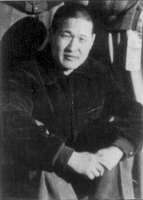 |
| Kim Won-pil, the young follower who came south with Moon to Pusan (HSA-UWC) |
Kim Won-pil kept a calendar, marking off the days to Moon's release. He visited him twice. Ok visited five times. Each time, some of the visitors who arrived with her were told their son or husband had died, and she wondered each time whether Moon would still be alive. One time the guards refused to let her give him some socks she had made. She imagined it was because they looked too expensive, so she made some more socks using her own hair, which she was allowed to give him next time.
The guards would hurry the visitors out, after they had handed over the food and clothing. At 6 p.m. the visits would be over. Prisoners sat in a circle in their cells to eat. They were not allowed to sleep until the 10 p.m. siren The evening was the only time in the whole day that they really had to talk, but talking was forbidden in the hut. There were no books, so they whispered quietly among themselves.
Pak, who was permitted to move freely before 10 p.m., came to Moon's cell and they spoke quietly about the Bible and Moon's teaching. Pak did not speak to the others in Moon's cell, because he knew that there were informers in each hut, trading information with the guards in exchange for food.40 At 10 p.m., everyone slept. Moon prayed and washed his face with his towel and slept at 10.30.
On Sundays they did not work. They sat in their cells and ate the same three meals. They were not allowed to sleep, so they talked quietly and shaved with bits of broken bottle picked up in the factory. Smokers saved butts they had picked up off the factory floor during the week and rolled cigarettes, rubbing cotton and strands of rope together to light them.
About once every six months, inmates were ordered to write 'reflections' and hand them in within the next week or two. They had to write about their revolutionary development and repent for their 'crimes,' and list any complaints about prison facilities.41 Forbidden to walk around the camp, they knew only their own hut. Each hut was made of cement and had wooden floorboards and pillars and a thick wooden door. The roof was tiled and one small glass window, with bars on the outside, allowed some light to penetrate the gloom. A squat-style toilet, in one corner of the room, afforded no privacy. But at least it had a lid, for which the man sleeping closest to it was grateful.
During the bitter winter, steam pipes provided heat in the cells. Each man had one blanket to lie on and one to cover himself As the huts were so crowded, they slept close together and kept warm. There was no heating in the factory, but even in winter, they sweated because of the work. Summer was unbearably hot. They wore the same clothes all year, unless visitors brought extra clothes. Moon caught malaria and became sick but refused Pak's pleas that he go to the sickbay. "I did not come here because of any crime42 but for my mission," he said. He continued working and recovered after a week or two.
Four times a year - the lunar new year, Kim Il-sung's birthday (April 15),Labor Day (May l)and the anniversary of the founding of north Korea as a state (Sept. 9) - were holidays. on one such occasion, smiling guards told prisoners they had slaughtered a cow for the next day's food. There was great excitement in the camp.
"Comrade Kim Il-sung has kindly allowed you to have beef today," the commandant said to the assembled prisoners, after a long speech extolling the country's leader. When the soup came, it looked no different from the usual soup.
"Did a cow walk through this soup with its boots on?" an ordinary criminal in the cell moaned. "There's not even a cow's hair in it."
"There are some slices of meat in it," a work-team leader said encouragingly. After that, prisoners did not get so excited about the extra food on holidays.
On another occasion, whale meat was added to the soup, and, by nightfall, most prisoners were experiencing stomach cramps and diarrhea. Some more serious cases collapsed and their hair began to fall out .
"What was in it?" Pak asked Moon.
"The meat was rotten. We all got sick because we are so hungry. Don't worry, people will get over it in a few hours. You should report it to the authorities, but don't worry. Worry instead about how to spread the Principle." Prisoners were given two days off work to recover.
In the spring of 1950, the prison authorities began classifying the inmates according to their crime and length of sentence. Many ordinary criminals were summoned by the commandant and released. Pak later concluded they had been drafted. In fact, they had been offered a choice of joining the army or serving out their sentence.43 Blackout screens were put up in the huts.
"Can I get you some rice powder?" Pak asked Moon one day, rather apprehensively, afraid he might be accused of tempting him with food.
"Don't worry about me," Moon replied. "Soon special things will happen. Worry about your own health."
Moon wrote a song using one of the labels for marking the weight of the fertilizer sacks. He called it 'Garden of Restoration' and sang it to the tune of a Japanese naval march and asked Pak to memorize it.44
In this world embittered
with hate,
Through the thousands of years,
Father was searching to find
One triumphant in heart;
There, where He struggled,
Behold, footprints
stained with blood;
Such love is given to us in His providence,
Such
love is given to us in His providence.
Here we find the flower of joy
In the freedom of God;
His garden blesses the world with the blooming of hope;
Fragrant perfume of His will
Fills us all with joy;
Such life fulfils
all the dreams of our Father's desire,
Such life fulfils all the dreams of
our Father's desire.
Fresh bouquets of happiness grow,
Gently tossed
in the breeze;
Our home eternal and true is a haven of joy;
Here in
such beauty divine,
We shall always live;
Such is the gift of the Lord,
Father's heavenly land,
Such is the gift of the Lord, Father's heavenly land.
God's
eternal providence
is the Kingdom on earth;
On earth He wanted to see
His true Garden in bloom;
Filled with perfume of the heart,
Spread
His glorious joy;
Such is the glory to come, crowning all of the world,
Such is the glory to come, crowning all of the world.
One day, some of the factory workers who used to check the weight of the sacks, told Pak that north Korea's forces were preparing to attack the South. The fertilizer which had been left by the Japanese, was going to Russia to pay for weapons, they said.
"What do you think will happen?" Pak asked Moon.
"Now the time is coming," Moon answered with confidence. "I told you the satanic world would be destroyed. Soon the kingdom of God on earth will be established. Have you memorized the 'Garden of Restoration'?" They hummed the song together. In the tense atmosphere which pervaded the camp that spring, Pak found himself singing the song to calm his nervousness.
A few days later, the head of the medical unit at the prison told him that weapons were arriving from Russia and that travel was being restricted.45
On June 25, 1950, north Korean tanks rumbled across the border in a massive attack which took the ill-equipped south Korean forces by surprise. Within three days, Communist forces were in Seoul. Prisoners in Hungnam aged from twenty to twenty-five with sentences under seven years were drafted, except for political offenders. Conditions in the camp deteriorated.
Within days, the first American troops, which had pulled out of the South in 1949, were back on the peninsula, this time under the United Nations' flag. Sixteen nations sent forces to fight for the South in the American-led UN forces. For ten days from July 7, a formation of nine or ten B-29 bombers flew over Hungnam and dropped bombs, which took out the city's bridges and other key targets. Each morning, over twenty thousand of the city's hundred and eighty thousand people took refuge in the hills, and returned home after the bombers had left.46
US military planners soon turned their attention to Hangman's industrial complex.47 When it was learned that one of the chemical plants was processing elements used in the Soviet nuclear program, the commander of UN forces, the American general, Douglas MacArthur, ordered special missions against the site. A request by military planners to use incendiary munitions was rejected by political leaders in Washington, fearful that fire raids would cause undue civilian casualties. The US Joint Chiefs of Staff also instructed that warning leaflets be scattered before the air strikes to give civilians time to flee. These considerations may have saved the lives of Moon and his fellow prisoners.
On July 30, shortly before 10 a.m., a massive sortie of forty-seven B-29 bombers flew over Hungnam in 'V' formations. Their mission, dubbed Nanny Able, was to take out the Korea Nitrogen Explosives Factory. The lead squadrons, flying above the clouds, pounded the factory, setting off huge fires. Flames leapt into the sky so high and intensely, they burned away the cloud cover so that the last squadrons could aim their bombs without radar.
Two days later, in the morning, a reconnaissance plane flew over the fertilizer plant. "The bombers will be here soon. We should move to the canteen," a prisoner, a former army captain, said to Pak. At noon, the sirens went off. The thirty thousand workers moved to underground shelters. Prisoners took shelter where they could. Forty-six B-29s appeared in the clear sky in the same V-Formations and bombed the factory for three hours. Their five hundred-pound bombs set off explosions which rocked the aircraft flying at sixteen thousand feet. The last squadron had to switch on its radar to see the target area through the clouds of black smoke which billowed up from the crippled plant. operation Nanny Baker, as it was called, had put the plant completely out of operation.
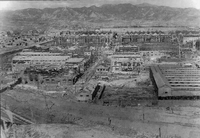 |
| Hungnam after US bombing raids (Imperial War Museum, London) |
"Weren't you hurt?" Pak asked Moon after it was over. Moon had been working in the area where empty sacks were stored when the bombing began.
"God said that no one would be hurt within a twelve-meter radius of me. While the bombing was going on, I was praying and communicating with the saints in the spiritual world," Moon replied. Pak, elated that they had both survived, began singing the 'Garden of Restoration' song.
After a body count, the guards announced that two hundred and seventy people had been killed during the raid.48
That night, Moon gave some of his rice powder to three prisoners, who were dying of starvation. Pak was due for release the next day, and spent most of the night talking with Moon in his cell.
"What should I do when I get out?"
"Go to Kyongchang-ri in Pyongyang and tell my followers there not to worry about me."
"I should not leave before you," Pak said, with tears in his eyes.
"This is nothing. It's just a short time. We have so much to accomplish. Go to Pyongyang and tell them I will be released soon."
In the morning, Pak was freed. He went to the fertilizer plant and saw Moon from a distance. Then he left for Pyongyang. The following day, August 3, the B-29s returned and destroyed their last major industrial target in Hungnam, the Bogun Chemical Factory.
With the fertilizer plant out of operation, prisoners were ordered to stay in their cells.49 The remaining common criminals were drafted into army auxiliary service, leaving about five hundred political prisoners, who on several occasions over the next few weeks, were taken into Hungnam to help rebuild houses destroyed in the bombing.
Meanwhile, the Communist advance south had been checked and, after the landings of United Nations' troops at Inchon and the recapture of Seoul in September 1950, the north Korean forces were being routed. As the retreat began, prison authorities planned to execute anti-Communist prisoners, and evacuate other political offenders to camps further north. Meanwhile, south Korean troops crossed the thirty-eighth parallel on September 30, and headed up the east coast for Wonsan.50
Large-scale massacres began at prison camps in Wonsan and Bongung, near Hungnam.
One night in the second week of October, guards stopped outside each cell in Hungnam prison, and shouted out several numbers. They ordered the prisoners whose numbers had been called, to come outside.
"What's happened?" one prisoner asked a guard through the cell window later that day.
"I don't know," the guard said. "I just saw they had a big sign hanging around their neck with their prison number written large. Their hands were tied. They were probably shot."
The guards came around and called out more numbers. Around ten prisoners were left in Moon's cell. Before the third roll call, south Korean forces had attacked an area near where many of the prison guards lived. The guards left to help their families escape, and returned the next day, October 14. The remaining hundred and fifty-two prisoners were assembled, and each was given a bag of rice to carry.
They filed out of the camp, heading north-west towards the city of Hamheung in groups of about twenty. Seven or eight armed guards accompanied each group. By nightfall, after several hours march in the rain, Moon's group reached a hill outside Hamheung and stopped.
"We are supposed to take you to Aoii," the chief guard said. "The tracks have been bombed so we cannot go by train. There are no ships available. We should walk." Aoji, the mining town in the north-east, near the Soviet border, was almost four hundred kilometers from Hungnam. The prisoners, weakened from years of hard labor and prison diet, were in no state to make such a trek.
"We cannot march that far," some prisoners said. "Why don't you just set us free?"
The guards agreed that the trek north would be almost impossible. They discussed the situation among themselves. After some time, they asked each prisoner to confirm his name, address, crime and how much of his sentence remained. When the list was complete, the chief guard addressed the prisoners.
"Do you promise that when the war is over, you will come back and finish your sentences?" he asked.
"Yes, yes," the prisoners promised. They couldn't believe what they were hearing.
"All right," the guard said. "If any officials ask you what happened, I will take responsibility. You are free to go home."51
The prisoners began setting off in twos and threes. Moon walked down the slope into Hamheung with Hahn Byoung-ku, a young anti-government student, who had been in his cell. When they reached the city center, Moon asked Hahn to go west with him, but Hahn declined.
"I should go home. My village is only a few hours north of here," he said. They parted in the city center.52
On the road, Moon met up with one of his followers in the camp, Moon Jong-bin, the young Communist party official.53 Jong-bin decided against going to his home, and the two men left together on foot for Pyongyang.
Two days later, south Korean troops took Hungnam and Hamheung, and continued their drive north. The tide of the war turned before the southern forces reached the Aoji camp. It was never liberated.
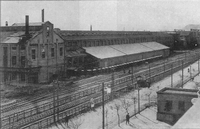 | 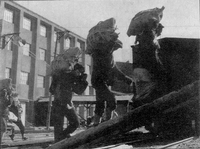 |
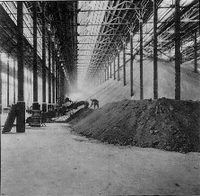 | 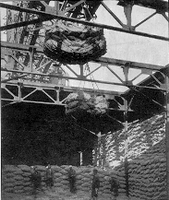 |
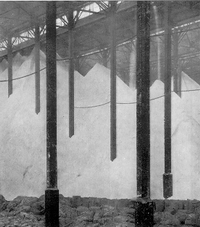 |
The fertilizer plant in Hungnam where Moon was a prison laborer from 1948 to 1950. These photographs were taken in the 1930s when the factory was run by a Japanese company. (Nippon Nitrogen Fertilzer Co., Tokyo)